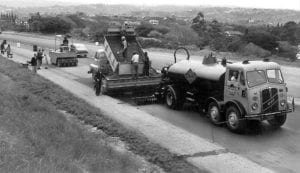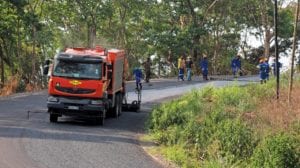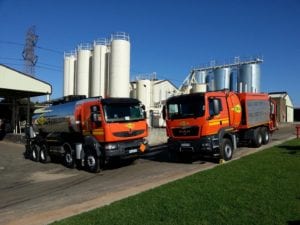Current budget restrictions now make it even more imperative that pavements are kept watertight and operational for as long as possible between scheduled maintenance interventions. Colas South Africa has the ultimate cold sealing and patch repair solutions, with extended workability a key feature.
Colas South Africa is on an expansion drive, with three key products spearheading its marketing strategy for 2018 to meet the pressing maintenance priorities of the local roads industry. These products comprise Colmat, Compomac and Colrub LT. On the microsurfacing front, Colmat is a well-known brand locally, which has been enhanced with improved formulations, while Compomac and Colrub LT are relatively new innovations in South Africa. All of these brands have become the mainstay on many projects in Europe and the rest of the world, and thus have proven applications and benefits for the local market. “Colas’ renewed focus is to be the preferred and dedicated manufacturer, supplier and applicator of bituminous binders and slurries in the South African road surfacing market – as a service provider, not a contractor. We also aim to reach Level 2 BBBEE status in early March 2018,” explains Cédric Monnet, managing director, Colas South Africa. Defying the ageing process
Defying the ageing process
The Colmat solution comes in four different variants for urban and secondary road maintenance scenarios. In terms of chemical formulation, Colmat is a cationic quickset bitumen emulsion mixed with selected crushed mineral aggregate, cement and water, and applied with a new purpose-designed spray system from Colas. Another key benefit is that Colmat products are very tolerant to varying aggregate qualities, which enables greater use of local materials rather than having to import higher-spec aggregates at greater expense.
Colmat prevents the ingress of water into the underlying layers of a road by filling in the cracks and voids of the existing surface. It also improves durability by preventing further oxidation of the aged binder.
Of the four options, Colmat L is a popular choice for provincial and municipal roads departments. This is a quickset microsurfacing emulsion modified with polymer, which is designed for existing surfaces carrying a wide range of traffic. Applications include existing blacktop surfaces or concrete pavements in single pass from 5 mm to 20 mm.
“Once applied, no subsequent compaction via pneumatic or drum roller is required,” explains Herman Groenewald, marketing manager, Colas SA. “The Colmat mix drying time is drastically reduced, the road can be reopened to traffic under a wider range of weather conditions versus conventional slurry and chip seals. This makes it a very cost-effective solution for waterproofing and restoring wearing course rigidity.”
Municipal end-users include the City of Tshwane, eThekwini Municipality, the City of Cape Town, Mogale City and Mbombela (Nelspruit). “In Mogale City, we sprayed a section that had an envisaged lifespan of five years, but is still performing well after 15 years,” he explains.
This microsurfacing technique is also environmentally friendly. Key benefits include low tyre noise and the absence of harmful emissions during application and curing.
 Colmat solutions
Colmat solutions
While Colmat L is one of the best-fit products selected for South Africa, consulting engineers and contractors can choose any of the other three options available, depending on the application, as described below:
- Colmat N is a normal quickset microsurfacing application that does not include polymer as one of its additives. Uses include existing surfaces carrying medium levels of traffic, and where traffic accommodation can be a problem for conventional slurry. In terms of overlay, the targeted applications are urban streets and provincial roads, and existing blacktop surfaces or concrete pavements in single pass from 5 mm to 20 mm.
- Colrut is a coarse-graded quickset microsurfacing product modified with polymer, which is designed as a cost-effective remedial solution for improving road safety by restoring the road profile and its skid resistance.
- Colpave is a medium-set polymer-modified coarse slurry that is ideal for mixing in a concrete mixer and is applied by hand for resealing small areas, such as sidewalks and car parks.
 Storable cold-mix asphalt
Storable cold-mix asphalt
Alongside reseals is the pressing issue of how to cost-effectively fill potholes. That’s where Colas’ Compomac solution slots in perfectly. This product was specifically developed as a cost-effective alternative to hot-mix asphalt, making it a very robust option thanks to extended workability.
Compomac is a cold-mix asphalt emulsion, which can be produced in either a mix plant or a pan mixer. It can be stored for up to 12 weeks in bulk, buckets or bags, and is available in black or red – the latter colour being popular for bus rapid transit (BRT) routes in South Africa.
Groenewald explains, “This product has been specially developed for the maintenance of roads with low or medium traffic density, with the added benefit that Compomac is ready to use whenever you need it for resurfacing or reprofiling tasks. Because it’s placed cold, the application period is lengthened, which also makes Compomac the perfect choice for labour-intensive construction.”
Compomac is also environmentally friendly, since there’s no need to heat aggregates, plus reclaimed road stone materials can be used. “In most cases, Compomac can be mixed using locally available materials, which reduces transportation distances and costs,” he continues.
Low-temperature bitumen rubber
Like Compomac, Colas’ Colrub LT solution is designed for a longer shelf life. This is also a ‘green’ solution, consisting of a blend of polymers, rubber crumbs and/or WMA modifiers. “Colrub LT is one of the best seals available on the market, especially for road surfaces that are slightly cracked, since minimal preparation work is required,” Groenewald states. The product can be blended at a central location and then transported to site over long distances. Table 1 illustrates the main differences between Colrub LT and conventional bitumen rubber (S-R1). The key advantages of Colrub LT include:- the elimination of (costly) site establishment in many cases
- reduced thermal degradation of bitumen, resulting in improved durability
- reduced possibility of bleeding due to the binder’s high softening point
- factors such as equipment breakdowns, inclement weather, etc. do not have an adverse effect on the quality of the binder
- once reacted, the properties of the binder remain virtually constant.




